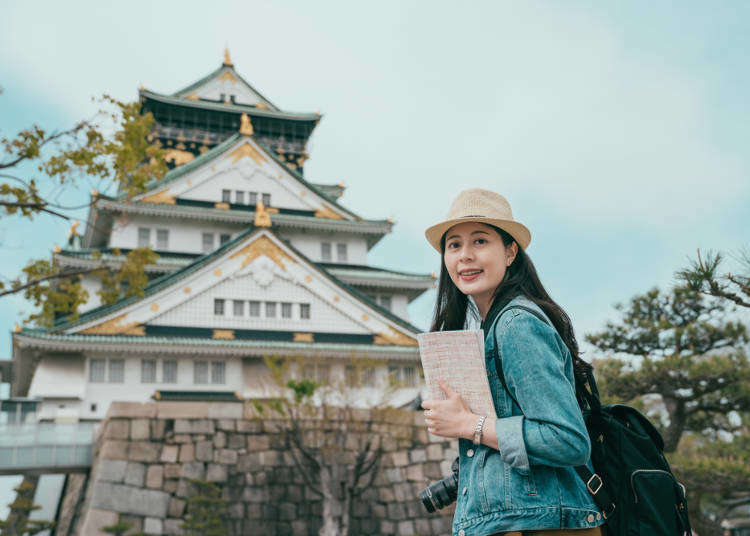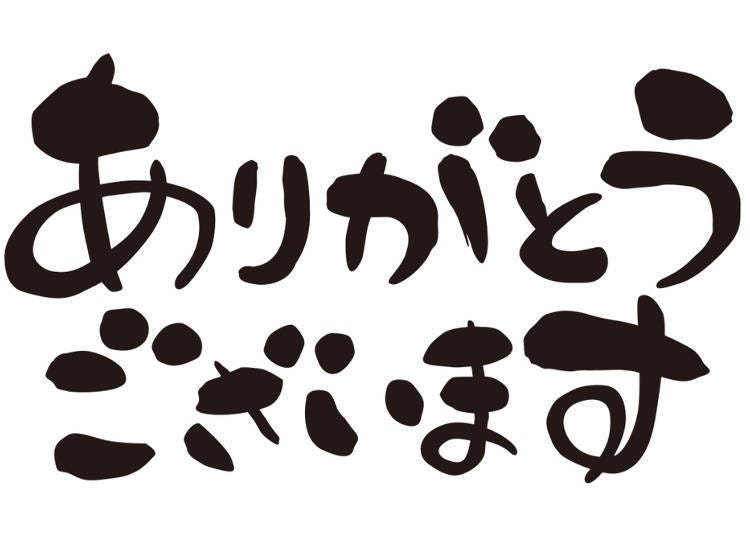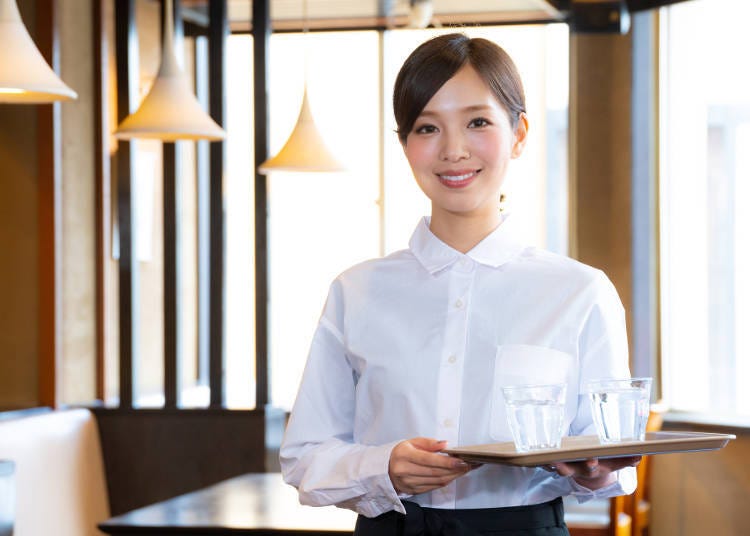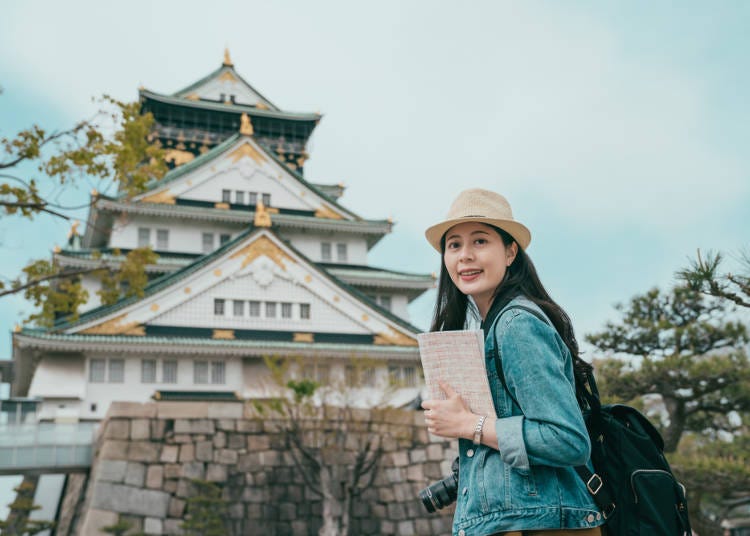
When asked to say a Japanese word most people will probably come out with konnichiwa, or more importantly arigatou (ありがとう - thank you). A word to express thanks which appears often in Japanese TV, movies, manga and anime, and if you have already been to Japan you have probably heard this word.
However, actually this isn’t the only way to say thank you, there are other ways which depend on the context of the situation and the speaker. So, LIVE JAPAN is going to introduce to you some of the different ways you can say thank you, along with a bit of context to give you some guidance!
Thank you: Arigatou(ありがとう)

Taking our first example, arigatou (ありがとう - thank you), this is a common and casual way to express thanks, and it can be made more formal by adding ございます(gozaimasu) to the end.
It can be modified to add different emphasis too, so if you are with friends, or on a business trip, you can add a bit more emotion to it! For example, adding どうも(doumo), or 本当に(hontonni) to the front of arigatou give it a stronger feeling of being very thankful, while saying 誠に (makotoni) adds a touch of sincerity to the phrase. This is true of the more formal version too, so どうもありがとうございます(doumo arigatou gozaimasu)is good in a business context for expressing that you are really grateful.
How to thank bosses and coworkers
Colleagues
When talking with work colleagues you can use 恐縮です(kyoushuku desu) or 恐れ入ります (osoreirimasu) to express gratitude, but as this also has the meaning of an apology too its usage is quite subtle, its best thought in terms of ‘thank you for your consideration’ or ‘thank you for your hard work/time’.
Colleagues or Customers
When thanking a colleague or customer for something they have done you can use お気遣い痛み入ります (okizukai itamiirimasu) and お気遣い嬉しく存じます (okizukai ureshiku zonjimasu), which are best translated as thank you for your kindness or thoughtfulness.
Superiors
If you are writing an email to senior work colleagues or see a business communication from a company director, etc., then you might come across心から感謝申し上げます (kokoro kara kansha moushiagemasu)which has a mixed meaning of both thanks and appreciation from the bottom of the heart. It isn’t something you would use when speaking as it is very formal, but it is just good to be aware of its meaning if you happen to get emails in Japanese from your boss.
Shop Assistants
In relation to customers you might see, or sometimes hear 感謝の念に尽きません (kansha no nenni tsukimasen) or 感謝の念に堪えません (kansha no nenni taemasen) which gives a real sense of gratitude for doing something, i.e. that the customer has come to your store, that the customer has bought something, etc. This is a way of saying thank you.
Workplace: Emails and Conversation
A common phrase in work emails and letters, and also spoken language in offices, is お世話になりました (osewani narimashita) which has a variety of meanings, one of which is to thank colleagues for ‘looking after you’ – it can be basically used as a way of saying thanks when someone does something for you.
Thanking customers or other companies

"You really helped me out!"
Another way of saying thanks for the help is おかげさまで助かりました (okagesama de tasukarimashita), in particular 助かりました gives a real sense that someone did something which really helped you out of a sticky situation, that they ‘saved’ you.
When giving gifts
Sometimes Japanese people will give gifts to express thanks, and will give a card with the gift which says お礼を申し上げます (oreno moushiagemasu). This is a formal way of saying thanks which is used alongside a gift.
"I'm speechless"
Another business expression is 感謝の言葉もございません(kansha no kotoba mogozaimasen)or お礼の申し上げようもございません (oreno moushiageyoumo gozaimasen). It basically means that the speaker, or writer, has no way of saying how grateful they are.
Respectful thanks
Within the way Japanese works in terms of social position, for example people can demonstrate respect for older people by using different language, 拝謝申し上げます (haisha moushiagemasu)is a way of lowering your own social position, i.e. telling the person you are speaking to that they are higher on the social ladder, and expresses both a sincere and humble thanks.
Thanking Customers

"Thanks for coming"
誠にありがとうございます (makotoni arigatou gozaimasu) was previously mentioned as a way to give sincere thanks, and it can also be used in stores where staff may use it to express gratitude for coming into their store.
An emotional thank you from the shop
心より感謝申し上げます (kokoro yori kansha moushiagemasu) was also covered above and can be said to customers to express more emotion while saying thanks.
A humble thank you from the shop
感謝いたしております(kansha itashiteorimasu)is a humble way of expressing gratitude and appreciation to a customer.
Thanking Friends and Family

Friends and Family
The most common situation you may be in while travelling in Japan is meeting friends and their family, in these cases you don’t need to worry about social status, formality or context. It is fine to use simple ways of saying thank you such as 本当にありがとうございます(hontouni arigatou gozaimasu), ありがとう(arigatou)and どうも(doumo).
Close Friends and Family
You can make things even more casual by using slang like サンキュー(sannkyuu)and サンクス(sannkusu) which is basically variations of the English term ‘thank you’, and you can use a slang version of arigatou in the form of あざっす(azassu)!
General Thank You Phrases for Sightseeing

For tourists, the most common expression will be "arigatou gozaimasu", and this is true regardless of whether you are buying things, leaving a store or a restaurant and more. Basically anywhere that you are receiving a service you can use this phrase to express your thanks. If you go on a homestay or stay at a Japanese friend’s house then on a day-to-day basis you can say “arigatou”, but at the end of your stay you can also say "osewani narimashita" to express thanks that they looked after you in Japan.
When you visit Japan next time, don't forget to say ありがとうございますarigatou gozaimasu) to thank Japanese people for their kind hospitality and amazing service!
*Prices and options mentioned are subject to change.
*Unless stated otherwise, all prices include tax.
Popular Tours & Activitiess
Recommended places for you
-

Kanzenkoshitsuyakinikutabehodai Gyugyu Paradise Sannomiya
Yakiniku
Kobe, Sannomiya, Kitano
-

ISHIDAYA Hanare
Yakiniku
Kobe, Sannomiya, Kitano
-

Jukuseiniku-to Namamottsuarera Nikubaru Italian Nikutaria Sannomiya
Izakaya
Kobe, Sannomiya, Kitano
-
Goods

Yoshida Gennojo-Roho Kyoto Buddhist Altars
Gift Shops
Nijo Castle, Kyoto Imperial Palace
-

Kambei Sannomiyahonten
Yakiniku
Kobe, Sannomiya, Kitano
-
Appealing

Rukku and Uohei
Izakaya
Sapporo / Chitose
-

From Haneda to Monchhichi's Hometown! Scenic Monorail Ride & Katsushika 'Old Downtown' Walk
by: Guest Contributor
-

Top 3 OSHI MAPs for the Best Matcha and Sweets in Tokyo
by: Guest Contributor
-

Farewell, Heavy Suitcases! Keisei Ueno’s New Service Makes Your Last Day in Tokyo Totally Hands-Free
by: Guest Contributor
-
Ad

Japan’s Land of Yokai Monsters and Spooky Stories! A Deep Journey to Mysterious San’in (Tottori & Shimane) for Seasoned Travelers
-
Ad

5 Recommended Wagyu Yakiniku Restaurants in Tokyo: Signature Dishes, Premium Beef, and Secret Sauces
-

Where to Buy a Japanese Kitchen Knife? Why Travelers Choose MUSASHI JAPAN's 14 Stores in Tokyo, Kyoto, and Nara
by: Guest Contributor
-

20 Best Things to Do in Fukushima Prefecture (Sightseeing Attractions, Local Foods & Activities)
-

Top 5 Things to Do in Hokkaido's Biei and Furano Area: Shirogane Blue Pond, Lavender Fields, And More!
-

'I Wish We Had These Back Home!' Real Travelers Reveal Favorite Japanese Sweets & Snacks
by: David McElhinney
-

Top Tokyo Sushi: Fresh Conveyor Belt Sushi Starting at ¥100?!
-

Visiting the Sacred Japanese Gardens at Entsuin Temple in Matsushima
-

Tokyo to Sendai: Riding the Shinkansen to Japan's Stunning Spots
- #best sushi japan
- #what to do in odaiba
- #what to bring to japan
- #new years in tokyo
- #best ramen japan
- #what to buy in ameyoko
- #japanese nail trends
- #things to do japan
- #onsen tattoo friendly tokyo
- #daiso
- #best coffee japan
- #best japanese soft drinks
- #best yakiniku japan
- #japanese fashion culture
- #japanese convenience store snacks












